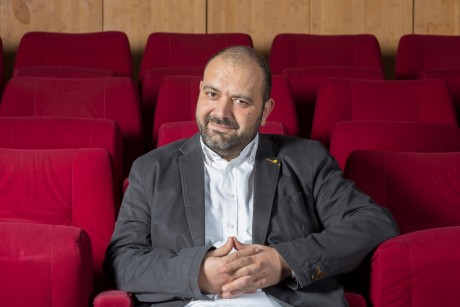


IDFA 2018

IDFA – November 14-25 2018 – has sent out a Newsletter “for Industry” revealing that “this year (we) will present an inspiring, diverse program featuring many impressive screenings… led by our new artistic director Orwa Nyrabia”.
With a click I went to discover what were the “new program sections and other changes to the festival”. Here are some of them with my comments and questions:
FEWER films in total with only 12 films in each competition category… to be
“even more selective… raising the profile of each film premiering at the festival… GOOD, will hopefully also make many of us viewers less confused and frustrated.
ONLY FIRST films in “First Appearance”… OF COURSE with a more clear focus on new talent, “to be assessed by a jury of renowned professionals”. OK, but I thought that was always the case! Maybe not?
STATEMENT: “Issues of gender and geography lie at the heart of the plan presented: both younger and more experienced advisors and selectors from around the world are being added to IDFA’s proven programming team. The Artistic Director pledged that IDFA will publish an annual diversity report and will ensure that its efforts – or shortcomings – in terms of inclusivity are transparent, accountable and useful to the global documentary film community…” HMM, smells a bit of political correctness, Orwa!
STAR GUEST: Czech master Helena Treštikova; could be seen as a conservative choice but from here, YES, so right to put her in focus!
A SCOOP: “Renowned Russian film scholar Nikolai Izvolov worked for years on unearthing the fragments of Dziga Vertov’s very first film, The Anniversary of the Revolution. Vertov made this film in 1918. Parts of the film were shot during the October Revolution in 1917 and a year later during the celebrations of October 1918. This is not only the first feature-length film Vertov made, but perhaps even the first creative documentary film ever made. In this film, we see the early signs of Vertov’s cinematic language as we know these from films such as Man With a Movie Camera: exploring aesthetic details, the individual versus the crowd, rhythm as well as the camera and the man with the camera as subjects.
Until recently, only twelve minutes of material had been recovered from this film, but during IDFA the entire film will premiere as part of IDFA on Stage.” WOW!
FOCUS PROGRAMS: “Me”, “The Memory of Space”, “Humanoid Cookbook”, the two first are easy to understand, the last one “will take the dining table as a metaphor and timeless stage for experimentation with new art forms and human behavior”. All right, are we viewers expected to sit and watch people eating on the stage…
FRONTLIGHT: … Up to twenty films – “IDFA’s view of the world through the eyes of filmmakers as opposed to the eyes of global media…” EXCITING WHAT COMES OUT OF THAT!
ART AND CINEMA… Maybe most important are these lines that could be interpreted as a (soft) criticism to IDFA’s previous emphasis on social, well-meaning documentaries: … the selection will be more rigorous with an even tighter selection that does not prioritize subject matter over artistic value and cinematic ambition… Yes, go ahead Orwa, and don’t forget to look to Eastern Europe, here there are many more auteurs to be found than Mansky and Loznitsa and Kossakovski.